Iran Calls For OIC Emergency Meeting Amid Hamas-Israeli Conflict
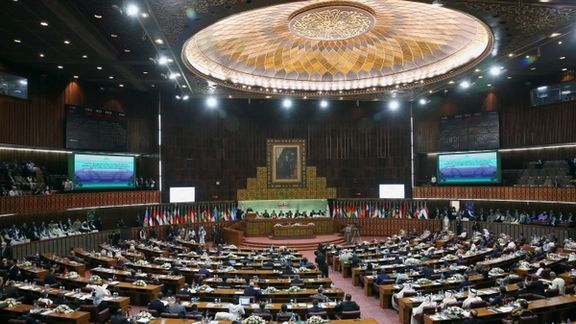
Iran has requested an emergency meeting of the Organization of Islamic Cooperation (OIC) as fighting between Hamas and Israeli forces escalates.

Iran has requested an emergency meeting of the Organization of Islamic Cooperation (OIC) as fighting between Hamas and Israeli forces escalates.
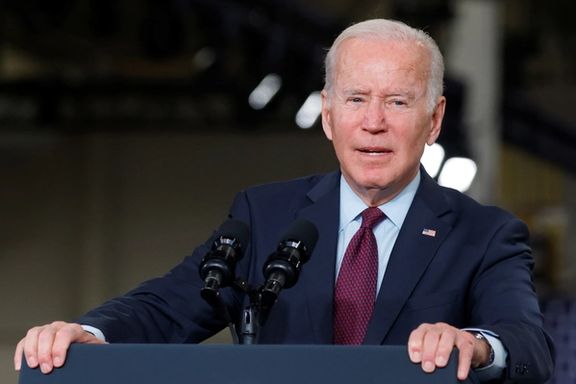
As it comes to light that “dozens” of US dual nationals have been kidnapped by Hamas, Israel’s bloody assault from Gaza now puts Biden at the center of another Iran-led hostage crisis.
The regime’s proxy in Gaza, Hamas, designated as a terror group by the likes of the UK and US, has taken around 150 hostages into Gaza after a mass infiltration into Israel on Saturday, including women and children.
On Sunday, President Joe Biden spoke again with Israeli Prime Minister Benjamin Netanyahu, confirming that “dozens” of American citizens are among the hostages seized.
It is Biden’s worst nightmare after a recent deal to secure the release of just five US-Iranian dual nationals saw the regime pocket $6bn in previously frozen funds from South Korea, and another $2.7 billion released from Iraq in June, although not officially part of the ransom.
Robert O’Brien, the former national security adviser under Donald Trump’s presidency, has even called for American special forces to be deployed to Israel to rescue hostages, as the war continues to see the death toll climb beyond 700 on the Israeli side, and close to 500 on the Palestinian.
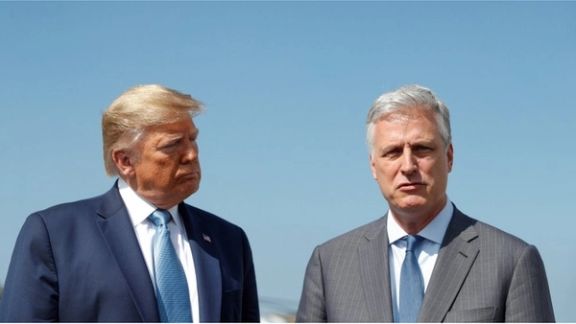
Speaking to Fox News, O’Brien said this weekend: “There is a direct correlation between taking Americans hostage and these big ransom payments. It has to end.”
Calling for the Biden administration to take urgent action after pictures of US-Israeli citizens began to circulate on social media, he said: “I think we need to get American servicemen who are specially trained to rescue hostages, we need to get them on the ground in Israel right away.”
The hostages in Gaza might prove to be one of the most difficult issues in this conflict, as they are now probably dispersed throughout the heavily populated Gaza strip and under armed guards. Once military operations subside one way or another, it is not clear what Hamas would demand for their release. If Israel invades the territory in full force, it is not clear what Hamas will do with the captives.
One of the citizens known to be missing is Hersh Goldberg-Polin, one of hundreds caught up in the war at a festival in Israel’s south. Hundreds of partygoers are still missing, and hundreds were slaughtered as Hamas gunmen landed in the midst of the festival with gliders and went on a killing spree.
Born in Berkeley, California, Goldberg-Polin had recently been discharged from the Israeli army and was working as a medic and waiter in Jerusalem before traveling to India.
US officials have said that at least four American citizens were killed over the weekend and an additional seven were missing and unaccounted for. Dozens more dual nationals are feared missing including German and British passport holders, Thais and Mexicans.
In spite of secretary of state Antony Blinken claiming to have seen no evidence of Iran’s orchestrating the weekend’s atrocities, the US began making moves that cannot be seen as anything but a message to the regime.
Defense secretary Lloyd Austin said Sunday he has ordered the Ford carrier strike group to sail to the Eastern Mediterranean to be ready to assist Israel.
The USS Gerald R. Ford, the Navy’s newest and most advanced aircraft carrier, and its approximately 5,000 sailors and deck of warplanes will be accompanied by cruisers and destroyers in a show of force that is meant to be ready to respond to anything, from possibly interdicting additional weapons from reaching Hamas from Iran and conducting surveillance.
The large deployment reflects a US desire to deter any regional expansion of the conflict. But the Israeli government formally declared war Sunday and gave the green light for “significant military steps” to retaliate against Hamas.
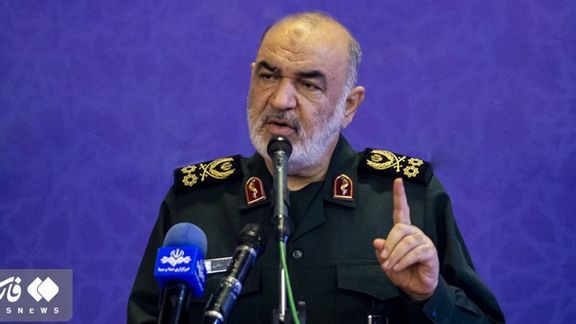
While the Biden administration claims it lacks evidence of Iran's role in Hamas's war on Israel, Iran continues to heap praise on its Palestinian proxy.
Hossein Salami, the IRGC Commander, declared, "Today, the people of Palestine are pursuing and arresting Israeli soldiers without any fear, and Israel can no longer declare victory. Today signifies the end of occupation and aggression, with even the Americans unable to save them."
His remarks coincide with reports from The Wall Street Journal, revealing multiple meetings held by the IRGC, Hamas, and Hezbollah to plan attacks on Israel in Beirut. Some of these meetings included Esmail Ghaani (Qaani), IRGC Quds Force Commander, and Hassan Nasrallah, the Secretary-General of Hezbollah.
The Iranian regime has openly signaled its involvement and support for Hamas, primarily through financial and arms support from Tehran and its leaders, Khamenei and Raisi, have both praised the weekend's onslaught.
In 2018, US President Donald Trump’s special Middle East envoy Jason Greenblatt claimed Iran provided $100 million annually to Hamas.
The Biden administration has faced significant criticism for maintaining diplomatic ties with the Islamic Republic and releasing $8.7 billion in blocked Iranian funds since June. Critics argue that providing financial resources to the regime enables it to fund terrorism in the region and globally.
In 2018, the US Treasury also revealed that it estimated funding to Hezbollah, Iran's Lebanese proxy and the biggest of its militia groups, was funded with at least $700m annually.
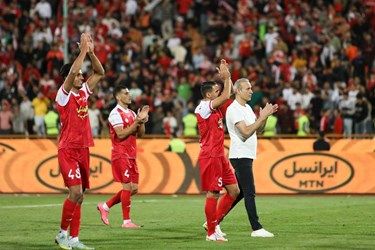
At a football match in Tehran, hundreds of Iranian fans chanted for the removal of Palestinian flags from the pitch on Sunday.
The protest was captured in viral videos circulating during the Israel-Hamas conflict. The death toll from the recent attacks had risen to at least 700 in Israel since Saturday.
Regime leadership has expressed support for Hamas, the Iran-backed militant group that launched hundreds of rockets at Israel. In Tehran, lawmakers were seen chanting slogans such as "Death to Israel, Death to America" on Saturday.
While the Islamic Republic's propaganda apparatus had organized street celebrations in support of the "Palestinian victory" in Tehran and other cities on Saturday evening, sources in Iran indicated that the participants were predominantly pro-regime and supporters of the Revolutionary Guards (IRGC) and their families. Ordinary Iranians had largely stayed away from these celebrations.
However, at the football match, a different sentiment emerged as Iranian fans voiced their opposition to Palestine. They could be heard shouting, "Take that Palestinian flag and shove it up your A**!"
Morgan Ortagus, a former US Department of State official, reacted to the video, expressing her admiration for the Iranian people.
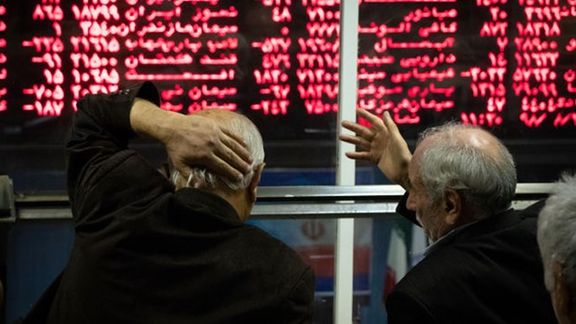
The bloody invasion of Israel by the Iran-backed Palestinian Hamas has caused a tumble in the Iranian economy, with the rial falling and stock market in decline.
The bloody invasion of Israel by the Iran-backed Palestinian Hamas has caused a tumble in the Iranian economy, with the rial falling and stock market in decline.
At the opening of trading day on Sunday, the Tehran Stock Exchange (TSE) crashed within just 30 minutes, with a sharp decline reported for almost all stocks on trade. Closing at 2.1 million points, the TSE main index dropped over 51 thousand points. The rial began to slightly fall late on Friday, before the attack, while the fall accelerated on Saturday. While for weeks the rial was hovering around 495,000 per US dollar, it broke through the 500,000 on Saturday and dropped to 520,000 on Sunday.
Iran's regime is openly supporting the horror which has seen over 2,000 Israelis wounded, at least 700 dead, and dozens abducted in Hamas's declaration of war, holding state-sponsored street ceremonies. President Ebrahim Raisi defended the atrocities as “the legitimate defense of the Palestinian nation” and held phone calls with Hamas leaders Ismail Haniyeh and Khaled Mashaal.
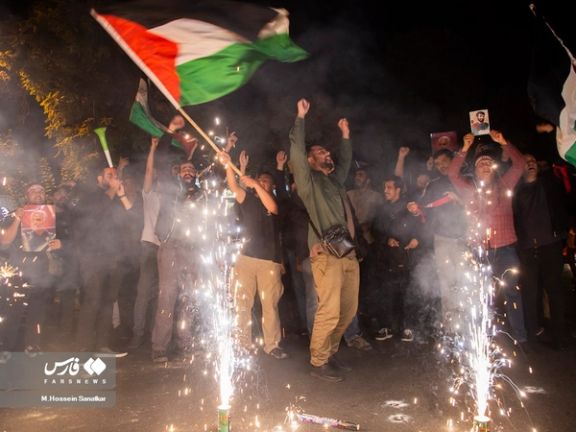
Tejarat News, a business website in Tehran, said in an article Sunday that the surge in the exchange rates of foreign currencies against the national currency rial is due to the developments in Israel. “Since Saturday, dollar traders are saying that tensions in Israel are the cause of the rise in the dollar's exchange rate,” the website said.
However, the impact of war was being felt in Israel too. According to Bloomberg, Israel’s stock exchange also witnessed the biggest drop since March 2020 and the outbreak of the pandemic while the shekel slumped towards a seven-year low in recent days, the war set to push that further. Israel has also faced a floundering economy amidst political instability since the return of the Netanyahu coalition at the start of the year which has plunged the country into economic and geopolitical turmoil.
The rial, however, has lost its value 12-fold since early 2018, when the United States withdrew from the JCPOA nuclear deal and imposed tough economic sanctions on Iran. This has made imports much more expensive and has led to inflation at around 50 percent for the past three years. Some officials and media in Tehran have been warning that tens of millions of people have fallen into poverty because of persistent high inflation, and this in turn has seriously contributed to political instability. Widespread anti-regime protests in 2022 and 2023 are partly attributed to financial hardships ordinary citizens face. For the transfer of such an amount to Iran, the greenlight by the US seems necessary given the country’s sanctions on the regime’s banking system.
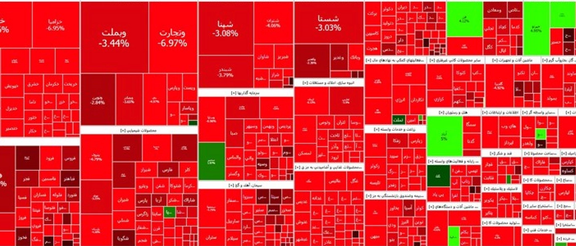
The sudden devaluation of the rial came a few weeks after Iran managed to get access to $6 billion of its assets that was blocked In South Korea due to US sanctions as part of a prisoner swap deal with Washington.
Whenever Iran’s economy is in a slump, regime officials start bragging about the positive prospects of releasing Iran’s frozen assets abroad on the control of inflation and freefall of rial, a propaganda line that never delivers. This time is no exception. Fars news agency, affiliated with the Revolutionary Guards, ran an article Sunday in line with Tehran’s effort for damage control, claiming that Iran’s unfrozen assets in South Korea and Luxembourg can have a positive psychological impact on the market.
The Central Bank of Iran (CBI) announced on Friday that Luxembourg has released $1.7 billion of Iran’s frozen funds, following a ruling issued by the country's Supreme Court. “This fund is now available to the Central Bank of Iran.” Former CBI Governor Abdolnasser Hemmati said in 2020 that Iran's assets were unfrozen despite an attempt by victims of terror to get the funds as compensation. In 2012, a New York court found there was evidence showing that the Islamic Republic provided "material support and resources to al Qaida for acts of terrorism".
In another case in 2023, a federal judge in New York ordered Iran's central bank and a European intermediary to pay out $1.68 billion to family members of troops killed in the 1983 bombing of the US Marine Corps barracks in Lebanon.
The attack has also ignited a wave of criticism directed at the Biden Administration over its deal with Iran and the release of funds that Iran is allegedly funneling to its proxies.
In May, Iran International reported that Hamas pressured the Islamic Republic into inviting its leader, Ismail Haniyeh, to Tehran hoping to get financial support. Our sources said that although the Islamic Republic continues to provide financial aid to Hamas despite its own economic situation, Tehran is not satisfied with the performance of the group against Israel.
While Hezbollah is by far Iran's richest and most powerful proxy, the combined funds of the Palestinian Islamic Jihad Movement, Hamas and the Popular Front for the Liberation of Palestine are enormous, Hamas and Islamic Jihad receiving a large share of Tehran’s aid. In March 2022, Haniyeh revealed that the Islamic Republic paid a total of $70 million to Hamas to help it develop missiles and defense systems. During an interview with Al-Jazeera, Haniyeh said different countries help in financing the group, but Iran is the biggest donor.
In 2018, US President Donald Trump’s special Middle East envoy Jason Greenblatt, who recently visited Israel's communities on the Gaza perimeter and toured the terror tunnel the IDF exploded, claimed Iran provided $100 million annually to Hamas compared to $700m annually to Hezbollah.
In a video on the official Al-Qassem Brigades' Telegram channel - the military wing of Hamas - published on Sunday, spokesman Abu Obaidah said, "We thank the Islamic Republic of Iran who provided us with weapons, money and other equipment. He gave us missiles to destroy Zionist fortresses, and helped us with standard anti-tank missiles."
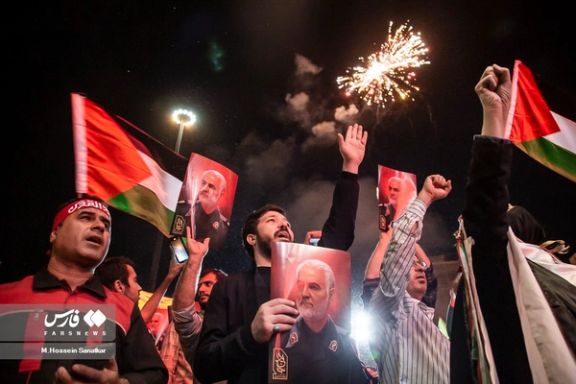
President Ebrahim Raisi and other regime officials praised Gazan militants for their terror attacks on Israel, but many ordinary Iranians resent this support.
Following separate phone talks Sunday with the Islamic Jihad leader Ziyad al-Nakhalah and Hamas Political Bureau Chief Ismail Haniyeh, Raisi issued a statement in which he said the Islamic Republic supports the “Palestinian nation’s lawful defense”.
Raisi accused Israel and its supporters of responsibility for “jeopardizing the security of regional nations”, for which he said Israel should be held accountable.
“Iran invites the whole world to observe the fact that the accumulation of oppression and injustice towards the oppressed Palestinian nation, the continuation of insult to women and prisoners, and the desecration of al-Quds and the first ‘Qibla’ of Muslims, will not last forever and are certain to face the resistance of nations,” he said.
Raisi chose his words apparently to deflect widespread international outrage at the wanton killing of Israeli civilians by the invading gunmen, who also kidnapped dozens of women and children.
Ghazi Hamad, a Hamas spokesman, told the BBC Sunday that the group had direct backing for the attack from Iran.
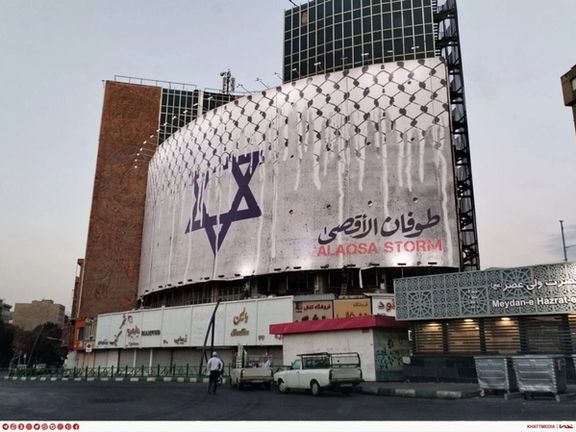
In an earlier statement, Major General Mohammad-Bagheri (Baqeri), Chief of Iranian Armed Forces Staff, had also called the surprise attack on Israel on Saturday, dubbed Al-Aqsa Storm, as a “glorious victory” and said these operations proved that “desperate attempts such as the ridiculous normalization process” would not be able to slow down or prevent Israel’s annihilation.
“Once the stone Intifada (uprising) was the Palestinian nation’s only defense tool, but today Palestinian fighters have reached a level of capability that enables them to deal strong blows to the Zionist enemy in a complex operation and make a mockery of its air defense systems and Iron Dome by firing thousands of rockets and missiles as part of a complex combined operation,” Bagheri said.
Admiral Ali Shamkhani, Secretary of Iran's Supreme National Security Council (SNSC) in a tweet Sunday also called the terror invasion “decisive, unique and successful” and a “real example of legitimate defense against a criminal regime”.
The Islamic Republic’s propaganda apparatus organized street celebrations for “Palestinian victory” in Tehran and other cities Saturday evening but sources in Iran say participants were pro-regime and Revolutionary Guards (IRGC) supporters and their families. Ordinary Iranians kept away from such celebrations; they maintained.
Footage and photos released by state media and pro-regime social media users also strongly suggest that these “celebrations”, even in large cities, were small and hastily organized propaganda events that failed to attract ordinary people who in the past decade have often protested to the regime’s massive expenditures to support its militant allies. Protesters have often chanted slogans such as “Neither Gaza, nor Lebanon. I will only sacrifice my life for Iran”.
A video posted with the caption “Remarkable presence of Esfahan residents in the celebration of Palestine’s victory over Zionist occupiers” shows only dozens of people gathered around a pick-up truck chanting slogans against Israel.
A photo published on X presumably showing “celebrations and happiness of people”, in Gilan-e Gharb, a town of 22,000 in western Iran actually shows a small group of men -- including a cleric, a soldier and others who look like government officials – standing in a line and holding posters of Supreme Leader Ali Khamenei, Qassem Soleimani and the founder of the Islamic Republic Ruhollah Khomeini.
A source in the southwestern city of Ahvaz told Iran International that the IRGC had held celebrations at the main squares of the city. “It was a sad and disconcerting situation,” he said, adding that ordinary people would not join the Revolutionary Guards’ celebrations and passed by ignoring them.
“There were no celebrations in Ekbatan. There were only a couple of places in Tehran where the suppressive Basiji [militias] celebrated,” a resident of Tehran’s defiant Ekbatan neighborhood told Iran International.
The death toll from the Hamas attacks, the most violent since the Yom Kippur (Ramadhan) War in 1973, has reportedly killed at least 600 people in Israel since Saturday.
In Gaza, the death toll of civilians in retaliatory Israeli attacks has risen to more than 370. Israeli military says it has also killed 400 Palestinian militants and arrested dozens.
World leaders including UN Secretary General Antonio Guterres have condemned the attack. Guterres said he was "appalled” by reports of attacks on Israeli civilians and their abduction from their homes.
Following the Hamas invasion of Israel over the weekend, the Iranian Foreign Ministry spokesperson, Nasser Kanaani, stated on Monday that "Tehran has called for an emergency meeting of the Organization of Islamic Cooperation (OIC) to discuss regional developments."
Iran denied involvement in the attacks in spite of a spokesman from Al-Qassem Brigades, the Hamas military wing, thanking Iran for its support on its Telegram channel. The onslaught which began on Saturday morning has resulted in the death of over 700 Israelis and the abduction of dozens of civilians and soldiers including women and children by the Iran-backed proxy. More than 400 Palestinians have also lost their lives in retaliatory airstrikes.
In spite of the close ties of Hamas to its biggest backer, Iran, US Secretary of State Antony Blinken said on Sunday that there was so far no evidence implicating Iran in the recent attacks on Israel. High level meetings have seen Hamas leader Ismail Haniyeh meet with regime leaders in Tehran and Beirut multiple times in recent weeks.
Seemingly in response to the allegations of Iran's involvement, Kanaani said, "Anyone who threatens the Islamic Republic of Iran should know that any foolish action will be met with a devastating response".
Meanwhile, Hossein Jalali, an Iranian MP, commented on Hamas's operation, dubbed Al Aqsa Storm, stating, "While we cannot physically participate in the conflict with Israel, we lend our support to Hamas." He added, "Our battle against Israel is waged through the resistance forces and their ideology."
Iran's support for Palestinian factions is part of a broader network of militias and armed groups it backs across the Middle East, which extends Tehran's influence into Lebanon, Syria, Iraq, Yemen, and Gaza. In 2018, the US Middle East envoy revealed the regime funds its Gaza proxy $100m annually.
The Hamas operation, considered the most significant incursion into Israel in decades which saw hundreds of militants infiltrate by land, sea and air, coincides with US-backed efforts to encourage Saudi Arabia to normalize relations with Israel in exchange for a defense agreement between Washington and Riyadh.